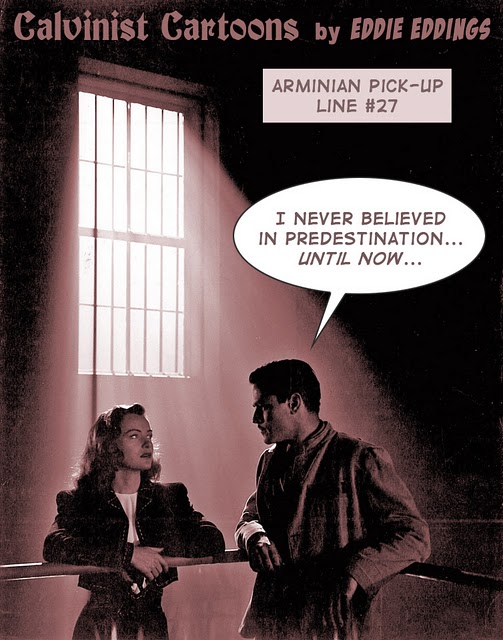At the aomin.org blog site, the following is a primer on the two perennial branches of theological systems in Christianity. Or to put it another way, there are two very different ways for believers to view how their salvation was brought about.
 In general, the first type (the Arminian-Synergist) affirms what is called “synergism.” Synergists believe that two forces in the universe are necessary to bring about regeneration in the life of the sinner. In specifics, the two forces at work (cooperation) that are necessary to bring about regeneration, or spiritual life, is the will of man and the Holy Spirit (grace).
In general, the first type (the Arminian-Synergist) affirms what is called “synergism.” Synergists believe that two forces in the universe are necessary to bring about regeneration in the life of the sinner. In specifics, the two forces at work (cooperation) that are necessary to bring about regeneration, or spiritual life, is the will of man and the Holy Spirit (grace).
To put it another way, the work of the Holy Spirit is dependent on the creature’s will, hence, “synergism” (working together). Synergists will sincerely say, “I believe in grace alone.” But in reality, they believe that grace is not alone (sufficient), but that man’s will is necessary for regeneration to be effective.
It could be said that synergists are “functional” Arminians because even though some will deny the label, their theology functions synergistically (thus, how they identify themselves is inconsistent with what they teach and believe).
The second group of believers (the Calvinist-Monergist) affirm what is called “monergism.” Monergists believe that there is only one force in the universe (grace alone) that brings about regeneration in the life of the sinner. In specifics, because of the deadness of man’s spiritual state, his moral inability, the Holy Spirit performs the miracle of spiritual resurrection (regeneration) in that person, hence, “monergism” (one work). Grace is sufficient to be effective, and does not depend on some action of man.
 In other words, the Holy Spirit does not merely whisper in the hardened sinner’s ear, hoping that the rebel sinner will “cooperate”; rather, while the sinner is in a state of hardness and rebellion, the Holy Spirit penetrates in the will of man and performs the miracle of spiritual life (regeneration). That is grace alone. Faith does not precede regeneration, regeneration precedes faith.
In other words, the Holy Spirit does not merely whisper in the hardened sinner’s ear, hoping that the rebel sinner will “cooperate”; rather, while the sinner is in a state of hardness and rebellion, the Holy Spirit penetrates in the will of man and performs the miracle of spiritual life (regeneration). That is grace alone. Faith does not precede regeneration, regeneration precedes faith.
But because of his great love for us, God, who is rich in mercy, made us alive with Christ even when we were dead in transgressions– it is by grace you have been saved. Ephesians 2:4-5
Yet to all who received him, to those who believed in his name, he gave the right to become children of God— children born not of natural descent, nor of human decision or a husband’s will, but born of God. John 1:12-13
He who belongs to God hears what God says. The reason you do not hear is that you do not belong to God. John 8:47
Arminians cannot affirm monergism (grace alone); they must always have the creature’s will as the final determiner of their destiny, not God. Inconsistently, Arminians pray (without knowingly) Calvinisticly, “God, change my unbelieving relative’s heart.” I have never heard them pray, “God, only whisper in my relative’s ear, but don’t change their heart unless you’ve been given permission.” In contrast, the Calvinist prays and affirms biblical truth consistently.




 Soli Deo gloria is the motto that grew out of the Protestant Reformation and was used on every composition by Johann Sebastian Bach. He affixed the initials SDG at the bottom of each manuscript to communicate the idea that it is God and God alone who is to receive the glory for the wonders of His work of creation and of redemption. At the heart of the sixteenth-century controversy over salvation was the issue of grace.
Soli Deo gloria is the motto that grew out of the Protestant Reformation and was used on every composition by Johann Sebastian Bach. He affixed the initials SDG at the bottom of each manuscript to communicate the idea that it is God and God alone who is to receive the glory for the wonders of His work of creation and of redemption. At the heart of the sixteenth-century controversy over salvation was the issue of grace.